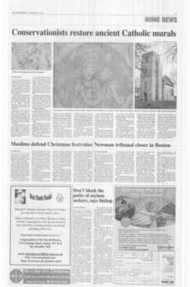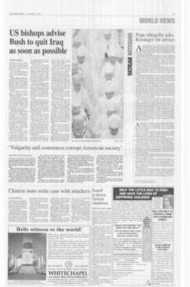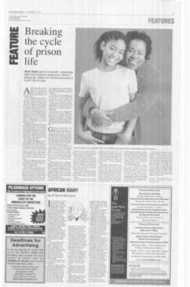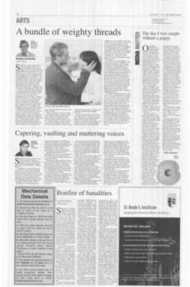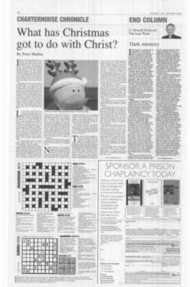Page 8, 17th November 2006
Page 8

Report an error
Noticed an error on this page?If you've noticed an error in this article please click here to report it.
Tags
Share
Related articles
Cardinal Hints That He May Stay On After 75
Anglicans Could 'think Again' On Women Priests, Says...
Save Us From The Clichés About Benedict
The Pope In His Own Words
Rebels Seek New ‘anglican’ Rite From Vatican
'A piano duet with the Pope
Speaking just before his first extended audience with Benedict XVI, the Archbishop of Canterbury talks to Freddy Gray about Richard Dawkins, women priests — and how close he is to Catholicism Archbishop, throughout history people have struggled to understand that Jesus is both fully God and fully man. Some eras have underlined the divinity of Christ, presenting him as a terrifying judge of mankind. Others have focused so much on his humanity that he seemed little more than a good man who taught us to be kind to others. I wonder where you think we are today: what are the characteristic insights and blind spots of our own age in relation to Jesus?
It's a wonderful question to start with because it is the most central that there could be. When 1 look at the history of the Christian Church, especially in the early centuries, what strikes me as extraordinary is that the temptation to go overboard for one or the other — the humanity or the divinity — is always there. The Church always resists it and says: "No, you've got to have both." But the balance has never been easy, I think.
Interesting that in the question the divinity of Jesus is associated with being a ternfying judge of mankind. I would say that the divinity of Jesus is about the Mystical Body; it's about Jesus as that end of life into which Christians are incorporated and which they express in the Eucharist. I think that is what we are missing today. We talk about devotion to Jesus. We talk about the quest for the historical Jesus. What often slips out of focus is that sense of the sacramental Christ. The life of the risen Christ is the life out of which flows the Holy Spirit; the Holy Spirit incorporates us, binds us into that Life, gives us the right to pray "Abba, Father" and gives us the right, in the Eucharist, to join in the prayer ofJesus as we receive the life of Jesus. That is the foundation of private and public prayer — the whole thing. One of the greatest influences for me was the theology of the liturgical movement of the 20th century — Gregory Dix or Lambert Beauduin, the Belgian.
When you write about the Incarnation you often use words such as "disruption", "interruption", "upheaval" and "bewilderment". Are you concerned that many Christians have become too familiar with the idea of God become man and need to let themselves be shaken to their core by it again? Perhaps not so much "familiar" as almost a "don't call us" mentality. When Dorothy Sayers was writing her radio plays about the life of Jesus she wrote lots of letters about them to various people and published those letters. She said: "What have we done? This is the most extraordinary thing you could imagine: the Maker of the universe sitting down to scrub his toenails on a roadside in Galilee. How on earth have we managed to make that boring?"
You know, it may be true. It may be false. It may be nonsense. But it is not boring. That is what I am trying to get at using words like "disruption" and so forth. What I see happening in the New Testament — to use the phrase that has been used by a couple of other writers — is that there's been some sort of explosion and here are all these people picking round the edge of a crater to see what has happened. A sort of Dr Who scenario. Because the words that you've got and the ideas that you've got are not going to be adequate to what's happened. So in the New Testament, you see John or Paul feeling their way into a new vocabulary. What have we got to say about this event? What must we say in order to capture the fullness of it? When you were chosen to be Archbishop of Canterbury you famously said: "If there's one thing I long for above all else, its that the years to come may see Christianity in this country
able again to capture the imagination of our culture, to draw the strongest energies of our thinking and feeling." Why did Christianity lose its grip on the imagination of the British people?
I don't really know. I think it is a little bit to do with this routinising of our talk and our worship which all the churches — yours and mine — are involved in. It's a little bit to do also with that curious post-Second World War loss of nerve in Britain. There was a very interesting study recently by a young scholar called Matthew Grimley, who said that the problem after the Second World War wasn't that people stopped believing in Christianity; they stopped believing in moral communities. That sagged and a rather materialistic, pragmatic spirit dug itself in a little further. I think we are still dealing with the consequences of that.
But do you think that modern Christianity might focus too much on the faith as a binder of communities, rather than something much more substantial?
There is a danger there. There are elements in government and public life which would love to have religious communities doing their work for them: binding communities. But it can't just be social cement. It has got to be a real inspiration, in the sense of seeing people and the world differently. When I was a research student I met someone who had been a close friend of a very, very remarkable old émigré woman Sonya Zernova. She, like many Russian emigres, was, although firmly anti-Bolshevist, a great believer injustice. She used to go and nag factory owners in France. One of them apparently said: "Why do you bother with these people? They are just animals." And she said: "No, they are images of God. That is why I bother about them." Now, that's capturing the imagination.
Do you think there are signs of growth, a recapturing of the imagination?
Well, there is a lot of interest isn't there? A couple of nights ago we had the launch of Theos, a new Christian thinktank. We had a very interesting discussion with Shirley Williams, Madeleine Bunting and Frank Field, who 1 think disagreed quite a bit about how near we were to a rediscovery of Christianity. Madeleine was pretty pessimistic. Shirley was a bit more optimistic. The interest is there and one sort of advantage is that a lot of people are now so ignorant of the Christian narrative and Christian imagery that it comes to them freshly.
So the further society gets from faith, the more we want it?
In one way. We may be better equipped to hear it as if it really were new — that is not impossible. When Philip Pullman's plays were on at the National, I did a conversation with him. The response to that was very interesting: a lot of young people in the wake of that clearly wanted to know what I was talking about.
The difficulty is that a lot of religious journalists, or people who think they know a bit about religious journalism, tend to have stereotypes about Christian belief: you know, either you are a liberal or you are a fundamentalist. In the middle of all that there is something much more interesting, I think, which is the great tradition that the Church proclaims and which I think, again, ought not to be boring.
Many people seem to instinctively reject Richard Dawkins, though he is the bestseller at the moment.
That's interesting, isn't it? I think it works in two ways. First of all, people are always a bit suspicious of people who are overdoing the argument and Dawkins is inclined to go over the top in what he says about the intellectual and moral corruption of religion.
Second, there is perhaps just a touch of scepticism about science. People have gone a bit beyond the idea that scientists are automatically to be listened to and believed when they talk outside their field. We are much more suspicious about science than we might have been 20 or 30 years ago. People think there is something a little bit fishy about science now. It's leading us in directions that we can't cope with. The fact that Dawkins is a very, very good scientist doesn't automatically mean that he is a very good philosopher ... which he isn't.
There is a burgeoning publishing industry devoted to announcing the imminent death of Anglicanism. A recent example is entitled Last Rites and is cheerfully subtitled The End of the Church of England. Does the Church of England still have the power to shape culture, or is it only able to be shaped by it?
"The Church of England as it now is no human power can save." Those words were spoken in 1831, at the time of the Reform Bill, so a little bit of historical perspective comes in handy. At the same time, it is clear that the Anglican Church worldwide, as it has evolved, has got to find some new ways of relating and organising its life because we have depended a little bit too much on what you might call "gentlemen's agreements". As the Church has become so much more diverse, then the old notion of a kind of spiritual version of the British Commonwealth becomes less plausible. We have got to do more and better theology and more and better thinking about structures. We are trying to do it, with the Windsor Report and so on...
As for the Church of England, you do get wildly differing accounts don't you? I have looked at Michael Hampson's book, and it doesn't do me any favours. But my feeling is that, on the ground, parish life is pretty much what it was.
There are real points of strain, especially finding enough volunteers to keep certain bits of the administration going — parish treasurers and so forth. At the same time, there are largely uncontrolled and unplanned bits of growth. My sense is of lots and lots of parishes that are very effectively plugged into their local communities, working, often heroically, with very limited resources with young people and young families. And while they have all sorts of anxieties about finance and maintenance, there is a basic confidence which I find very striking. It's not as if everywhere is in decline and low morale.
That's not to ignore the points of strain and the challenges — like all churches we face huge challenges. I don't sense. though, that in the majority of parishes there is a massive crisis of confidence. The decline in Sunday worshippers, which again affects all the churches, seems to have slowed a bit and we are beginning to realise that we have got to count in those who don't worship on Sundays for whatever reason — those who, if you like, slip through the net of counting
and what we get is not a straight downward graph but a diffused pattern of loyalty to the Church much more varied than it was a generation ago. And at the same time also we have a rising number of candidates for ordination, quite startlingly in a way. Having said last year that 1 thought we needed a really substantial percentage increase in candidates under 30, I look at the statistics this year and rather to my surprise they seemed to have got it. But shaping and being shaped was the question wasn't it'? I think it does still
shape culture to a remarkable extent and the first of the two areas where this is most obvious is education, where it is still quite clear that people at large have an investment in a religious dimension to education, however much columnists in certain newspapers don't like it. The other area is this question of partnership, regeneration, and the fact that in so many areas of our country the Church is the only organisation that has a nonnegotiable long-term presence in the community. The building, the priest, the very fact of a regular activity, a resource for the community, a professional who lives in the middle of the community and doesn't commute in — these are shaping things. It is partly because of that there remains this sense that the Church is there for people and exercising a kind of pull.
Shaping on the wider stage, the country as a whole, harder to say. It is interesting that, in talking about the reform of the Lords for example, there is a surprising reluctance on the part of those discussing it to say: "Well, we can just dispense with the bishops and / or the guaranteed religious element."
Does this not tie in with the twinning of Anglican identity with Britishness? Do you think that can both hold the Anglican Communion back and hold it together? I think what we are seeing is the swings and roundabouts of that. There is some thing about the involvement of the Church of England in the British political identity that is a very useful springboard for the work of the Gospel, but it something also that can be a bit of straightjacket in the global Church as it emerges. Part of my job. having a role in England and a role in the Communion, is trying to ride those two horses.
Your book on St Teresa of Avila suggested that you have a quite remarkable affinity for the Catholic world, for its saints, theologians and artists. Could you tell me about your relationship with the Catholic Church and how it has influenced your life?
The Welsh environment in which I grew up was, on the whole, deeply suspicious of Catholics. Catholics were foreigners: Irish, Italian or Spanish. You might be surprised to know there was a substantial Spanish community in the upper Swansea valley in the mid-20th century. The Spanish were right out of consideration; the Irish were just a local nuisance; the Italians were tolerable just because they had very nice icecream shops. When we started attending a rather more AngloCatholic parish church in Swansea that was a sort of gentle introduction to an awareness of other kinds of priority and shape for worship. We'd moved house; we'd moved from a context in which we had been regular members of a Presbyterian chapel to a village where the parish church was the most important religious presenc.e, which we loved, and the whole family had flung itself into enthusiastically. It was a curate in the parish who, when I was about 14, lent me some of his books to read, including St Teresa's autobiography. So I was beginning to find my way in this, to understand a bit about the monastic tradition, about traditions of prayer. The teaching we had in the parish was solidly sacramental, very much focused on the Eucharist. It was old-fashioned High Churchery, but with very serious emphasis on the centrality of the Sunday morning parish Eucharist and the daily Mass in the parish. That's what I grew up with and it still forms who I am and what I am as a Christian. And an interest in both history and literature in school intensified that. All of that helped me find my way a bit into the Catholic world.
How close did you get to becoming a Roman Catholic?
I thought about it a lot for several years, during most of my student years. That was a time when the biggest influences on me were coming from one or another kind of Catholic environment. I was reading St John of the Cross and a lot of that tradition. I was making retreats regularly at Benedictine monasteries. Also, writers like Henri de Lubac and Hans Urs von Balthasar were the people who got me excited. And I was thinking about whether my calling was in monastic life and, if so, was it in that sort of context? The thing I couldn't quite manage was, as it were, signing up to the theology of the papacy as it evolved. I couldn't cope with Vatican 1. And I didn't think that it was particularly honest to pretend otherwise or cut a corner. So I sat there chewing my nails for quite a while, not quite sure what would emerge. I think it was the experience of teaching theology to Anglican candidates for ordination that made me feel: "Well, they're coping with it. Perhaps I need to cope with it and offer myself in good faith for ordination in the Anglican Church and see what happens."
So it would be the decree from Vatican I on papal infallibility that proved the real obstacle?
That's what I found the hardest, but there were other things that I wasn't comfortable with: some aspects of the doctrine of grace as it evolved, but I think it was that that was the really tough thing.
What aspects of the doctrine of grace?
Oh, I could never quite get my mind round indulgences and the slightly, without being unkind, mechanical, factory approach.
What attracted you then?
The life of prayer, the life of sacraments. I found that technical side harder. I think that is where my studies of the Eastern Orthodox tradition came in at that point, because I was researching Russian Christianity at that period. That had the kind of scepticism about the papacy and about certain aspects of the doctrine of grace that I thought: "Yeah, OK, I understand those questions." So that is why I am not...
A Catholic? Yes.
Last year the book Father Joe by Tony Hendra appeared. This brought the extraordinary personality of Dom Joseph Warrilow vividly to life. You have described yourself as one of Fr Joe's "spiritual children". What did he mean to you?
For several years, everything in terms of nurture and encouragement. His photograph is still on my desk. I think it was, as Tony Hendra describes, the sense of being taken completely seriously and having somebody's love and prayerful attention just wrapping you around, with no reproach and no agenda — just that sense of, yes, an unconditional love. I have seldom met it in anyone, but there was this remarkable man who was just there in that way. Tony Hendra says at end of the book how surprising it was him and for many people to that, where they had thought they were the really spe person for Joe, there were at 500 others. For somebod: give that sense of abso specialness to quite so m people is amazing. Theirs sort of freemasonry of pc( you bump into and say: "Ah one of Joe's boys."
Did you discuss joining monastic life with him?
I discussed that and all son aspects with him. And the g thing was he never put me UJ any pressure. He helped me what was true and what false. He'd very gently : "Look, aren't you being t romantic about all of this? D try and be more holy than need be. Take it gently and your prayers."
How would he have answc your concerns about the p: infallibility?
I still remember the cony( tion we had about it, becau very nearly tipped me over. said: "Well, I have alvt thought of it as being a bit the promise you make of b obedient to the abbot. You' the community. You acknt edge where the leadershit You just say: 'OK,! arn corr. ted to that.' Well, if only it that... but a great man for w I give thanks constantly.
In 2002 you published a about praying with icon the Virgin. Are you that remarkable of things Marian Archbishop of Cas bury?
Well, I'd like to think I Vl Christian Archbishop of Ca bury and therefore a Ma Archbishop of Canterbury. kind of Anglicanism in wh grew up with wasn't panicla the idea that a proper devoti Mary was part of proper C tian practice. It was when I bishop in Wales that this ( home more because I us( take groups from the die every year to Walsingham week.
We would take quite E group from the diocese, 90 people sometimes. Ai remember the first time I such a group thinking that is something about this ( ronment and people disc( ing Mary as a mother and sister in the Church, some so life-giving and liberatin people, that I really net rediscover.
blog comments powered by Disqus




